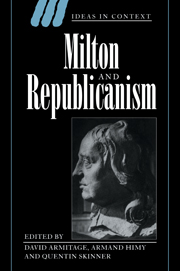Book contents
- Frontmatter
- Contents
- Notes on contributors
- Preface
- PART I DEFINING MILTON'S REPUBLICANISM
- PART II MILTON AND REPUBLICAN LITERARY STRATEGY
- 4 Biblical reference in the political pamphlets of the Levellers and Milton, 1638–1654
- 5 The metaphorical contract in Milton's Tenure of Kings and Magistrates
- 6 Milton, Satan, Salmasius and Abdiel
- 7 Paradise Lost as a republican ‘tractatus theologico-politicus’
- PART III MILTON AND THE REPUBLICAN EXPERIENCE
- PART IV MILTON AND THE REPUBLICAN TRADITION
- Index
- Recent titles in the series include
5 - The metaphorical contract in Milton's Tenure of Kings and Magistrates
Published online by Cambridge University Press: 27 October 2009
- Frontmatter
- Contents
- Notes on contributors
- Preface
- PART I DEFINING MILTON'S REPUBLICANISM
- PART II MILTON AND REPUBLICAN LITERARY STRATEGY
- 4 Biblical reference in the political pamphlets of the Levellers and Milton, 1638–1654
- 5 The metaphorical contract in Milton's Tenure of Kings and Magistrates
- 6 Milton, Satan, Salmasius and Abdiel
- 7 Paradise Lost as a republican ‘tractatus theologico-politicus’
- PART III MILTON AND THE REPUBLICAN EXPERIENCE
- PART IV MILTON AND THE REPUBLICAN TRADITION
- Index
- Recent titles in the series include
Summary
The Light of humane minds is Perspicuous Words, but by exact definitions first snuffed, and purged from ambiguity; Reason is the pace; Encrease of Science, the way; and the Benefit of man-kind, the end. And on the contrary, Metaphors, and senslesse and ambiguous words, are like ignes fatui; and reasoning upon them, is wandering amongst innumerable absurdities; and their end, contention, and sedition, or contempt.
When Hobbes expressed his fear in Leviathan that the ‘equivocall signification of words’ would precipitate rebellion, he was articulating a view widely shared by sixteenth-and seventeenth-century Englishmen. Of particular concern was the ambiguity of Scripture, for Renaissance Englishmen had experienced at first hand how the metaphorical interpretation of Scripture could give rise to antinomianism, false prophecy and political anarchy. In The Arte of English Poesie, George Puttenham had linked ‘doubtfull speaches’ with ‘blind’ prophecies designed to stir up ‘insurrections’, and had recommended that the poet avoid such dangerously ambiguous ‘propheticall rymes’. Thomas Wilson had similarly cautioned the reader of The Rule of Reason not to construe the New Testament in an illegitimately metaphorical sense: spiritual ‘freedom’ should not be understood metaphorically to imply political ‘freedom’. Such views were regularly articulated in sixteenth-century treatises on government and rhetoric; yet the Civil War, the regicide of Charles I and the outpouring of anti-monarchical pamphlets gave them a new urgency in the 1640s and 1650s. In these pamphlets, parliamentarians and radical sectarians marshalled the languages of biblical covenant and political contract to prove that political obligation was not absolute but open to interpretation.
- Type
- Chapter
- Information
- Milton and Republicanism , pp. 82 - 105Publisher: Cambridge University PressPrint publication year: 1995
- 2
- Cited by



